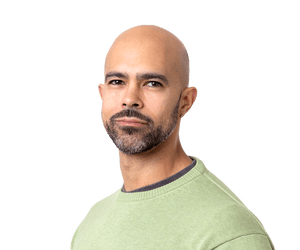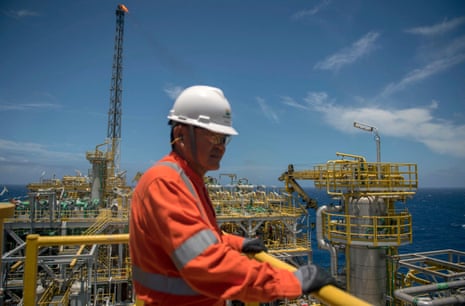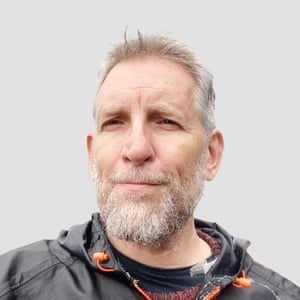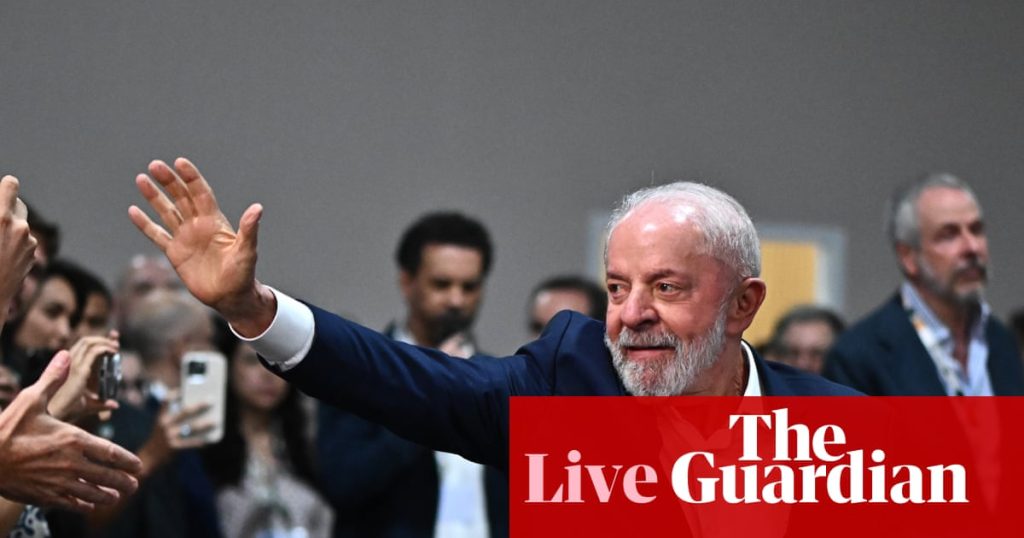Brazilian president Lula addresses the conference

Damien Gayle
On Wednesday evening I joined a crowd of journalists, including my colleague Fiona Harvey, veteran of many Cops, to wait outside a plenary room in the artificially Baltic surroundings of the Cop30 conference centre.
Rumour had it that the Brazilian president, Luiz Inácio Lula da Silva, who had earlier arrived at the UN climate summit, would soon emerge to speak to journalists. What exactly we would do if he did emerge was unclear.
There was no guarantee that we, out of the several hundred journalists who had gathered to catch a glimpse of Lula, would even get close. And even if we did, neither of us spoke enough Portuguese to quiz him on the finer points of international climate politics.
But then, without warning, some members of the press to our right began peeling off, moving back down the huge grey tented corridors that snake through the centre. Others nervously equivocated, then began to follow, first at a stride, then at a jog, then a sprint, whooping and hollering.
“News stampede!” shouted Fiona. “Damien, run!” I did as I was told, chasing my fellow members of the press corps, dodging tripod legs wielded at face height, trampling those too weak or slow to get out of my way, determined but unsure of where we were going, or where this race would end.
Finally, outside the conference centre’s “VVIP Lounge”, a new crowd began to form. I joined it, muscling my way as close to the front as possible, where harried looking UN guards fought to keep the jostling crowd of journalists at bay.

And as I stood there, staring at a closed, whitewashed door, shoulders squared to stop any overly keen rivals from trying to get past me, I slowly began to realise: I had no idea what on earth was happening.
If one moment sums up my experience of the Cop30 talks so far, this was it. Although I have followed – and covered – the Cop proceedings from London for several years, the Belém climate summit has been my first in-person experience of the international climate negotiations. And I don’t think it’s any threat to my journalistic machismo to admit that these talks are bewildering.
Multiple tracks of negotiations, all articulated in obscure acronyms and insider jargon; texts and draft texts; huddles, scrums and doorsteps; and thousands of people whose roles are all entirely vague but no doubt also vital to the future of the planet.
Cop attendees who spoke to the Guardian agreed that this edition of the UN climate summit is more complex than in recent years. Usually by this late stage of the negotiations talks would have coalesced around a totemic issue that would be seen as definitive. In fact, that was partly why Lula was there, to try to bash some heads together: high-level ministerial meetings, an attempt to get some decisions taken. Brazil had hoped to get a package of measures gavelled through by the end of Wednesday night. That deadline passed without a text appearing; the hosts now promise it on Thursday.
Before he headed off again, Lula told reporters that the proposal for a roadmap to the end of oil use does not involve “imposing anything to anyone” nor “determining deadlines for countries to stop burning fossil fuels”, the main cause of greenhouse gases responsible for global warming.
“We need to reduce greenhouse gas emissions. And, if fossil fuel is a thing that emits a lot, we need to start thinking about how to live without fossil fuel, and build the way to live [without it].”

“I am so happy that I leave here certain that my negotiators will have the best result a Cop could have ever offered to the Planet Earth,” the Brazilian president said. He believes that the best deal can be negotiated, “because, in a COP, we don’t impose anything, everything has to be consensus, it has to be a lot of conversation. And we respect the political, ideological, territorial and cultural sovereignty of each country. We don’t want to impose anything, we just want to say it’s possible.”
His words, however, are a little optimistic. Rifts on key issues remain, particularly around climate finance, unilateral trade measures, progress on emissions-reduction plans and the central issue of whether countries will agree to develop a “roadmap” setting out how the world will transition away from fossil fuels.
That means there is plenty of bewildering work ahead, and many more late nights in the Cop media centre. As Fiona is keen on reminding me: “Cop is a marathon, not a sprint.”
Share
Updated at 07.37 EST
Key events
Please turn on JavaScript to use this feature
UN Secretary-General António Guterres has begun speaking at the summit, urging countries to work together to deliver fair outcomes that are “concrete on funding and adaptation, credible on emission cuts, and bankable on finance.”
More to follow…
Share

Jonathan Watts
The elephant in the room is a cow
At last someone at Cop30 is talking about the main cause of Amazon destruction and Brazilian greenhouse gas emissions: the price of beef.
It has taken more than two weeks of the conference and hundreds of panels on every other topic under the sun to get on to this point, but finally someone had the courage to suggest that Brazil – and all other nations – should put a tax on meat and diary, and use the revenue this generates to subsidise healthier plant-based foods.
“It’s the elephant in the room,” said Tim Reysoo at a press conference by the True Animal Protein Price Coalition (TAPP). “There are 60,000 delegates at Cop30 and we are the only ones mentioning this.”
The health and environment problems caused by beef and other types of meat are global, but nowhere is worse affected than Brazil.
The presentation noted that 74% of Brazil’s greenhouse gas emissions come from food production, mostly in the form of deforestation to clear land for farms and pastures.
The world’s biggest meat producer, JBS, which originated in Brazil, is a major sponsor of Cop30 and its representatives are part of a “food systems working group” inside the conference that is drawing up policy recommendations for governments.
By contrast, the TAPP coalition’s event was poorly attended, but the participants drew applause for arguing that plant-based products from a living Amazon should be a climate solution: “The future of sustainable food already exists inside the forest,” said Larissa Carreira of Te Protejo, a Latin American NGO dedicated to animal rights. “The Amazon shows these solutions already exist. Our role is to strengthen and scale them.”
The speakers said Europe should take the lead. They noted that the EU currently spends €380bn to subsidise agriculture, even though it accounts for only 1.2% of GDP. If it instead put a €1 per kilogram tax on meat, this would generate €35.6bn of revenue, which could then be used to subside healthier foods.
This would also reduce pressure on health systems. The panel displayed a Lancet study that found health-directed taxation of meat products could yield a 9% decrease in premature deaths related with red meat and processed meat consumption with an estimated 14% decrease in attributable health costs globally.
“We need governments to provide incentives to guide consumers to food that is healthy for people and the planet,” said Jeroom Remmers of The True Animal Protein Price Coalition.
The coalition called on the Cop conference to include a reference to “transitioning away from animal protein overconsumption.”
The meat industry has also come under fire for its enormous discharge of methane, a gas that heats the planet far more than carbon dioxide. Finding solutions for this is a topic of a panel discussion later this morning organised by Mighty Earth.
In a rare positive development, another of Brazil’s big beef producers, Marfrig, is expected to announce a methane target at the panel.
Share
Updated at 09.05 EST

Ajit Niranjan
Two key pieces of climate jargon – adaptation and mitigation – are sometimes seen as alternative ways to survive a hotter planet. In reality, people’s worlds are already being torn apart by weather that has been made more violent by fossil fuel pollution and more deadly by human mismanagement.
A few weeks ago I spoke with Toñi García, who saw this first-hand. Here is her story.
I had been working with my husband, Miguel Carpio, for over 30 years. We would spend the day together, we would meet at work. With our daughter, Sara, and her boyfriend, we went everywhere – the gym, the dentist, the hairdresser – as a happy and close-knit family.
In my house, there wasn’t a pair of trousers, a dress or a sock that we didn’t buy together. In my family, there was never a day without an “I love you” or a hug.
On 29 October 2024, we left work at half past four in the afternoon and arrived home at around five to our apartment on the fourth floor of a building in Benetússer, on the outskirts of Valencia. Despite working for the regional government, we had received no warning about the rains that were falling in the interior of the Valencian community.
But my daughter – a nurse working at La Fe hospital on the intensive care ward – was scared. At half past six, she asked me from the balcony if the town could get flooded. I told her it was impossible. I’m 60 years old and I had never seen it flood. My elders had always led me to believe that it was impossible. Still, as a civil servant who knows the system, I knew that if there was any danger, the authorities would contact us via WhatsApp or text. I made her look at her mobile phone. She had no messages, no alerts. We asked my husband, who also had nothing.
I tried to reassure her, saying: “Look, they haven’t warned us about anything, so nothing is going to happen.” My husband and I continued doing things at home. She stayed on the balcony, worried, and at exactly quarter past seven in the evening, she cried: “Mum, Dad, come, come.” We looked out and saw a very low tongue of brown water, less than 15cm deep.
The first thing we thought to do was to take the car on to the street in case water seeped into the underground garage. My husband went downstairs and my daughter, who drives a separate car, joined him. I stayed on the balcony and called my sister, who was in Valencia city, to tell her not to come over that night.
But not long after they went down, I heard a strange noise in the background. It was as if something heavy was being dragged on asphalt. I looked to the right and suddenly saw a huge wave carrying a wall of reeds. And that scared me, because right afterwards, water started coming in, very strong and with high pressure. It was dragging containers, and soon it was dragging cars. It lifted up all the cars that were parked on the street and started to carry them away. I hung up on my sister and immediately the power went out. We had no electricity.
Read the full story here.
Share

Damian Carrington
There was excitement on Tuesday when 82 countries from across the globe came together to back a roadmap for the transition away from fossil fuels. Making progress on phasing out the root cause of the climate crisis is frustratingly difficult at UN Cops, because the need for consensus decisions means petrostates like Saudi Arabia can easily block efforts.
However, an analysis by Carbon Brief shows that despite the backing of 82 nations, the roadmap remains far from being passed. That is because while 82 is almost half of the nations at Cop30, they represent just 7% of fossil fuel production. If the big producers can’t be somehow persuaded to get on board, the roadmap will be a road to nowhere.
Share

Adam Morton
Adelaide has lost out to Antalya to host next year’s Cop. My colleague Adam Morton, the Guardian Australia’s environment editor, has the account from Belém of what went down.
Ouch. From one perspective, Australia’s long-running bid to host the Cop31 UN climate conference next year has ended in clear failure.
It campaigned for more than three years for the rights to put on the world’s biggest climate summit and green trade fair, which would have brought tens of thousands of people to the South Australian capital of Adelaide next November.
That’s not happening. Instead, the conference known as Cop31 is headed to the resort city of Antalya, on the Turkish Mediterranean.
The result will be a major let down to many people who had hoped hosting the climate carnival could help accelerate Australia on a transition from being a fossil fuel economy to a renewable energy superpower, and bring international focus to the existential plight facing Pacific island nations, who would have been co-hosts.
The process that led to failure has been an opaque mess. In recent days, there have been doubts that Anthony Albanese and other senior figures really wanted the bid to succeed. The prime minister’s language sent mixed messages at best. It translated to stories in the Australian and international media saying the government was walking away.
This contrasted with the message being relayed at the Cop30 talks in the Brazilian city of Belem, where the Australian climate change minister, Chris Bowen, had just declared the country was “in it to win it”.
Uncertain support is not a new issue for Australia’s Cop31 bid. While Bowen championed it, other senior members of the government have only occasionally appeared to care.
The Department of Foreign Affairs and Trade, traditionally responsible for international climate negotiations, has been disengaged and sometimes outright opposed.
There is little sign Albanese has considered UN climate conferences a priority. He hasn’t attended one since becoming prime minister in 2022. We’ll never know for certain, but some will wonder if more could have been done to get the bid over the line.
That’s the negative take. But there is another way to look at it.
In the context of the Cop30 talks this week in Brazil – and from an international perspective – the announcement on Wednesday night may, perversely, have been the best result possible.
Read the full story here.
Share
Updated at 07.56 EST
One big piece of news out of Belém last night was that Turkey will host Cop31 next year, with Australia leading the actual negotiations, under a deal to end an unprecedented stand-off between prospective host countries.
The unusual arrangement, which was being negotiated overnight and is expected to be officially announced today, would see the event take place in Antalya, a 2000-year-old Mediterranean city that has become the country’s tourism capital. Turkey would manage the event while Australia would preside over the diplomatic wrangling to stop the planet from heating and keep people safe from the breakdown of a stable climate.
Crucially, the resolution of the spat could still leave space for vulnerable Pacific island nations – who were part of Australia’s bid to host the summit – to play a significant role. Australian climate minister Chris Bowen told journalists last night that the deal could involve an event on a Pacific island before the summit to pledge money for a Pacific resilience fund.
Share
Brazilian president Lula addresses the conference

Damien Gayle
On Wednesday evening I joined a crowd of journalists, including my colleague Fiona Harvey, veteran of many Cops, to wait outside a plenary room in the artificially Baltic surroundings of the Cop30 conference centre.
Rumour had it that the Brazilian president, Luiz Inácio Lula da Silva, who had earlier arrived at the UN climate summit, would soon emerge to speak to journalists. What exactly we would do if he did emerge was unclear.
There was no guarantee that we, out of the several hundred journalists who had gathered to catch a glimpse of Lula, would even get close. And even if we did, neither of us spoke enough Portuguese to quiz him on the finer points of international climate politics.
But then, without warning, some members of the press to our right began peeling off, moving back down the huge grey tented corridors that snake through the centre. Others nervously equivocated, then began to follow, first at a stride, then at a jog, then a sprint, whooping and hollering.
“News stampede!” shouted Fiona. “Damien, run!” I did as I was told, chasing my fellow members of the press corps, dodging tripod legs wielded at face height, trampling those too weak or slow to get out of my way, determined but unsure of where we were going, or where this race would end.
Finally, outside the conference centre’s “VVIP Lounge”, a new crowd began to form. I joined it, muscling my way as close to the front as possible, where harried looking UN guards fought to keep the jostling crowd of journalists at bay.
And as I stood there, staring at a closed, whitewashed door, shoulders squared to stop any overly keen rivals from trying to get past me, I slowly began to realise: I had no idea what on earth was happening.
If one moment sums up my experience of the Cop30 talks so far, this was it. Although I have followed – and covered – the Cop proceedings from London for several years, the Belém climate summit has been my first in-person experience of the international climate negotiations. And I don’t think it’s any threat to my journalistic machismo to admit that these talks are bewildering.
Multiple tracks of negotiations, all articulated in obscure acronyms and insider jargon; texts and draft texts; huddles, scrums and doorsteps; and thousands of people whose roles are all entirely vague but no doubt also vital to the future of the planet.
Cop attendees who spoke to the Guardian agreed that this edition of the UN climate summit is more complex than in recent years. Usually by this late stage of the negotiations talks would have coalesced around a totemic issue that would be seen as definitive. In fact, that was partly why Lula was there, to try to bash some heads together: high-level ministerial meetings, an attempt to get some decisions taken. Brazil had hoped to get a package of measures gavelled through by the end of Wednesday night. That deadline passed without a text appearing; the hosts now promise it on Thursday.
Before he headed off again, Lula told reporters that the proposal for a roadmap to the end of oil use does not involve “imposing anything to anyone” nor “determining deadlines for countries to stop burning fossil fuels”, the main cause of greenhouse gases responsible for global warming.
“We need to reduce greenhouse gas emissions. And, if fossil fuel is a thing that emits a lot, we need to start thinking about how to live without fossil fuel, and build the way to live [without it].”
“I am so happy that I leave here certain that my negotiators will have the best result a Cop could have ever offered to the Planet Earth,” the Brazilian president said. He believes that the best deal can be negotiated, “because, in a COP, we don’t impose anything, everything has to be consensus, it has to be a lot of conversation. And we respect the political, ideological, territorial and cultural sovereignty of each country. We don’t want to impose anything, we just want to say it’s possible.”
His words, however, are a little optimistic. Rifts on key issues remain, particularly around climate finance, unilateral trade measures, progress on emissions-reduction plans and the central issue of whether countries will agree to develop a “roadmap” setting out how the world will transition away from fossil fuels.
That means there is plenty of bewildering work ahead, and many more late nights in the Cop media centre. As Fiona is keen on reminding me: “Cop is a marathon, not a sprint.”
Share
Updated at 07.37 EST
Good afternoon, this is Ajit Niranjan joining you from Berlin as we enter the final days of the 30th United Nations climate summit. My US-based colleague Gabrielle Canon will be taking over later today to guide you through the latest.
Share

